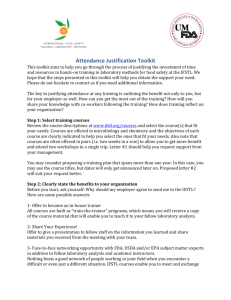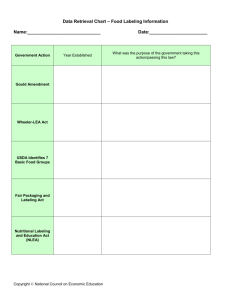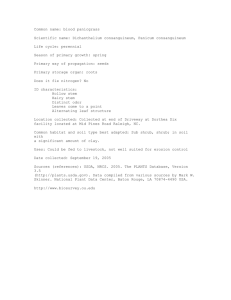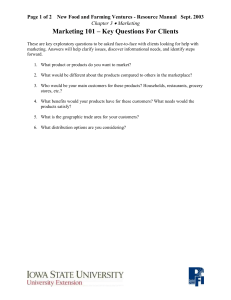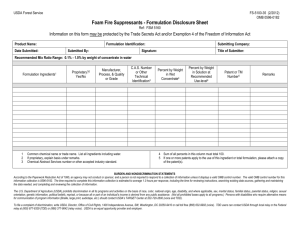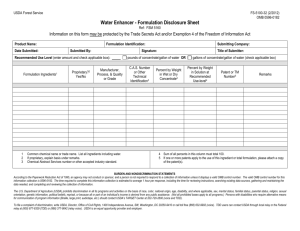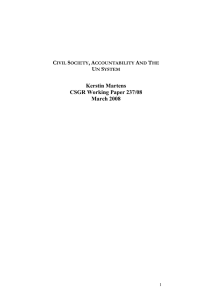Food Architecture
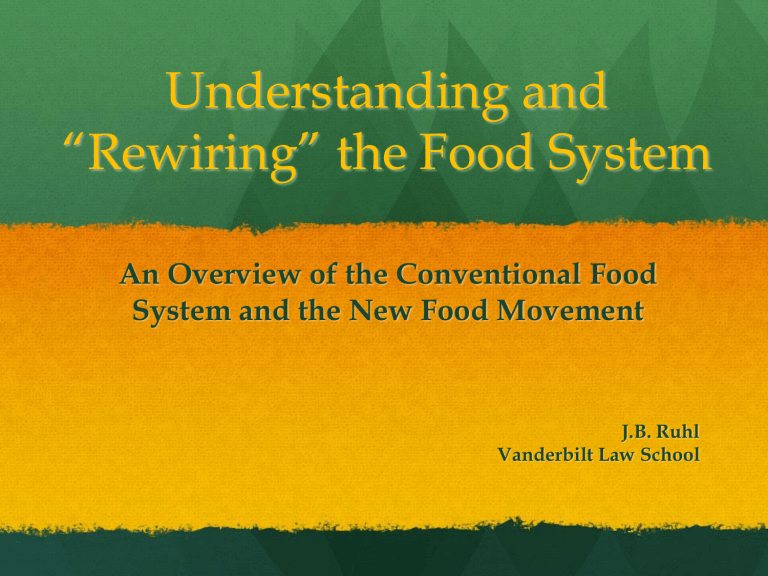
Understanding and
“Rewiring” the Food System
An Overview of the Conventional Food
System and the New Food Movement
J.B. Ruhl
Vanderbilt Law School
Overview
I. Introduction
II. Overview of the conventional food system: tracking food from farms to post-consumer
III. Overview of food system regulation: lots of laws and agencies have a hand on our food
IV. The New Food Movement: Rewiring the System a) Themes b) Social and policy movements c) Legal issues – general and CSAs
Big Picture Themes
The conventional food system is an industrialized, highly-regulated food production, processing, supply, and consumption economy
Vast footprint
Highly economically “efficient”
Highly depersonalized
The “New Food Movement” concept captures many social and policy themes pushing back on the conventional food system/regulation
Emphasizes local economy, personal networks, ecological efficiency, producer and consumer liberty
The problem is, much of what the New Food
Movement wants is expensive and/or illegal
The Food System
What is the conventional food system?
Food System Regulation
How is the food system regulated?
(based on Food System Seminar presentation by VLS student Travis Gray)
Food regulatory chain
Agriculture
USDA
Food safety: Meat, poultry, processed eggs
Subsidies
Insurance
EPA
Pesticide use
Renewable fuel standards
Non-point source pollution?
FDA: unprocessed eggs
BLM: livestock grazing
FWS & NOAA: fisheries management
DoE: biofuel subsidies
DoL: employment standards and temporary workers
Food regulatory chain
Processing and
Manufacturing
USDA
inspects slaughterhouses and processed eggs
FDA
food safety for all food products not under USDA
NOAA and NMFS
Voluntary Seafood
Inspection Program
Retail
FTC
Consumer protection laws
USDA
Meat, poultry, processed egg labeling
Certification standards through Agriculture
Marketing Service
FDA
Labeling for all products not under USDA
Food regulatory chain
Consumers
HHS
Diet and nutrition programs (with USDA)
USDA
Consumer education on meat, poultry, and eggs
Food and Nutrition Service
SNAP
EPA
Drinking water
Post-Consumer
State and local gov’t: waste management such as municipal landfills, recycling programs, composting, etc.
EPA
Disposal of toxic substances
Landfill regulation
FDA & USDA: limitations on post-consumer uses due to food safety regulations
Food regulatory chain
Misc./throughout
CDC
Conducts research on food borne illness and tracks food related outbreak
USPTO
protecting trademarks and patents for food products
DoT
Food shipping and vehicle standards
DHS
Customs enforcement and import control
DoJ and FTC
Enforcing antitrust law within the food system
EPA
Farms are not exempt from
ESA
Regulating dinner: shrimp & grits
Idea: take a single dish and evaluate the regulatory system pertaining to the ingredients
Agency
USDA
FDA
NOAA
NMFS
EPA
FTC
USPTO
Local
DoL
Ingredient
Corn
Andouille
Cheese
Shrimp
Butter
Shrimp
Shrimp
ANY
ANY
ANY, especially corn
ANY
ANY
Regulation
Subsidy, insurance, etc.
Slaughter, processing, label
Safety, processing, label
Safety, processing, label
Safety, processing, label
Fisheries (if wild, processing inspection
Fisheries (if wild)
Pesticide use, landfill and toxic waste disposal
Consumer protection
Trademarks for wholesaler; patent for some GMOs
Waste and landfill management
Labor and immigrants
The New Food Movement
A Challenge for Conventional Food System Regulation www.dirtyandthirty.com
Major Theme
Conventional –
Transactional Model
Food supply chain as series of transactions
Industry consolidation and vast transport network eliminates relationships
Consumer has little knowledge of food source
Consumer has no relationships across the system
NFM –
Relationship Model
Food supply chain is
“shortened”
Local food sourcing concentrates transport network and tightens relationships
Consumer has more knowledge of food source
Consumer can establish relationships within the local network
Social/Policy Movements
School lunch reform
Animal welfare
Anti-GMO
Organic
Obesity
Local Food
Food sovereignty
Urban agriculture
Farm Bill reform
Cage free/Free range
CSAs and farmers markets
Food safety reform
Farmland preservation
Food deserts/swamps
Farm to table/school
Farm worker rights
Environmental protection
Nutrition labeling
Marketing to children
Stop fast food and sugary drinks
No antibiotics
Trade & globalization
Legal Issues - General
Urban agriculture – zoning restrictions
Commercial kitchen regulations
Direct to consumer sales restrictions
Labeling claims and requirements
Raw milk (herdshare legal in TN)
Intellectual Property
Certification systems
Food safety requirements
CSAs
Rewiring Source-to-Consumer
Farmer’s Markets and CSAs
Legal Issues for CSAs
Business entity decision
Risks of sole proprietorships/general partnership
Shared risks and contracting
Risks of oral agreements and handshakes
Defining pickup procedures, crop mix, ups and downs
Interns and worker shares
Dep’t of Labor has strict intern rules
Food, meals, lodging complications
Work-shares as possible employment
Personal injury, insurance, and risk exposure
Injuries to interns and work-share workers
Food Safety Modernization Act
Small farm exemptions not automatic for CSAs
FSMA exemption does not preempt tort law liability

